The Ethics of Selling Hair Growth Serums Without Evidence
In the bustling marketplace of beauty and wellness, where promises of transformation are as abundant as the products themselves, hair growth serums stand out as a beacon of hope for many. These elixirs, often adorned with enticing labels and grandiose claims, promise to restore crowning glories and revive lost confidence. Yet, beneath the glossy surface lies a contentious issue that demands our attention: the ethics of selling these potions without solid evidence of their efficacy. As consumers, we are drawn to the allure of quick fixes and miracle cures, but what responsibilities do sellers have in ensuring the truth behind their promises? This article delves into the murky waters of marketing ethics, exploring the fine line between aspiration and deception in the world of hair growth serums.
Ethical Implications of Unproven Hair Growth Claims
The beauty industry often finds itself at the crossroads of innovation and ethics, especially when it comes to products like hair growth serums that promise miraculous results without substantial scientific backing. Unproven claims can not only mislead consumers but also raise significant ethical concerns. Companies must consider the potential harm in promoting products that lack verified efficacy. When individuals invest their trust—and money—into such products, they may experience disappointment or even a sense of betrayal when results fall short of expectations. This is not just a matter of customer dissatisfaction but also a potential breach of ethical responsibility.
To navigate these murky waters, businesses can adopt several ethical practices:
- Transparency: Clearly communicate the current state of scientific evidence related to the product.
- Honesty: Avoid exaggerated claims that cannot be substantiated by research.
- Accountability: Offer refunds or guarantees if the product does not perform as advertised.
These steps not only foster trust with consumers but also help elevate industry standards, ensuring that beauty doesn’t come at the cost of integrity.

Understanding Consumer Vulnerability and Trust
In the realm of hair care, the market is flooded with products promising miraculous transformations. Yet, the ethical landscape becomes murky when hair growth serums are sold without substantial evidence backing their efficacy. At the heart of this issue lies consumer vulnerability—a critical factor that businesses must navigate with care. When consumers invest in such products, they often do so from a place of hope and trust. This trust can be easily exploited, especially when companies prioritize profit over transparency. Trust is a fragile entity, built on the premise that consumers can believe the claims made by a brand. Without scientific validation, these promises can lead to disillusionment, impacting not just consumer satisfaction but also brand reputation.
To foster genuine trust, brands should focus on transparency and ethical marketing practices. Consider these approaches:
- Providing evidence-based claims: Ensure that any product claims are backed by credible research or clinical trials.
- Clear labeling: Include all active ingredients and their known effects to educate consumers.
- Honest advertising: Avoid exaggerated claims and ensure that marketing materials accurately reflect the product’s capabilities.
By adhering to these practices, companies can not only build a loyal customer base but also contribute to a marketplace where consumer vulnerability is respected and trust is genuinely earned.

The Role of Regulation in Cosmetic Marketing
In the world of cosmetic marketing, regulatory frameworks play a pivotal role in maintaining the integrity and trust of the industry. These regulations are designed to ensure that products are safe for consumers and that the claims made by companies are substantiated by evidence. Hair growth serums, often marketed with promises of lush and rapid results, must adhere to these rules to prevent misleading consumers. However, the challenge lies in balancing innovation with compliance, where companies must navigate complex guidelines while pushing the boundaries of beauty science.
Regulatory bodies, such as the FDA in the United States or the EMA in Europe, require that any claims about a product’s efficacy be backed by credible scientific research. This ensures that consumers are not misled by exaggerated or unfounded promises. Key aspects of regulation in this domain include:
- Labeling Requirements: Clear and accurate information must be provided, detailing the product’s ingredients and intended use.
- Claim Substantiation: Any claims about the benefits of a product must be supported by robust scientific evidence.
- Safety Testing: Products must undergo rigorous safety assessments to ensure they do not pose harm to users.
By enforcing these regulations, authorities aim to foster a marketplace where consumers can make informed decisions, ensuring that the pursuit of beauty does not come at the cost of truth or safety.

Guidelines for Ethical Advertising Practices
When promoting hair growth serums, it is imperative to adhere to ethical advertising practices to maintain trust and credibility. Transparency is key: ensure that all claims are backed by solid scientific evidence and clearly distinguish between proven results and aspirational statements. Misleading consumers with exaggerated benefits not only tarnishes brand reputation but also risks legal repercussions. Remember to use language that is both honest and easily understandable, avoiding complex jargon that may confuse potential buyers.
- Authenticity: Use real testimonials and avoid fabricating reviews.
- Clarity: Clearly disclose any limitations or potential side effects.
- Responsibility: Avoid targeting vulnerable audiences with unrealistic promises.
- Integrity: Present all information truthfully, without omitting critical details.
By following these guidelines, brands can foster a responsible marketing environment that respects consumer intelligence and promotes informed purchasing decisions. Ethical advertising not only benefits the consumer but also contributes to a sustainable business model in the long run.
Concluding Remarks
As we draw the curtain on our exploration of the ethics surrounding the sale of hair growth serums without substantiated evidence, it becomes clear that this is not merely a question of commerce but a deeper reflection on trust, transparency, and responsibility. In a world increasingly driven by the allure of quick fixes and miracle solutions, we stand at a crossroads where integrity must guide innovation.
The path forward demands a delicate balance—a harmony between the promises made by the sellers and the expectations held by the consumers. It is a call for open dialogue and rigorous scrutiny, where claims are not just marketing tools but commitments grounded in verifiable truth.
As consumers, let us wield our purchasing power wisely, asking the right questions and seeking clarity amidst the noise. For the creators and marketers of these products, may this be an invitation to lead with authenticity, ensuring that their contributions to the market are as beneficial as they are bold.
Ultimately, the journey of understanding the ethics of selling hair growth serums without evidence is ongoing, a narrative still being written. It challenges us all to ponder where we stand and what we value in the ever-evolving landscape of health and beauty. it is a story not just about products, but about people—about us.


